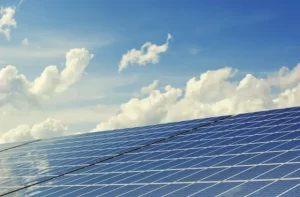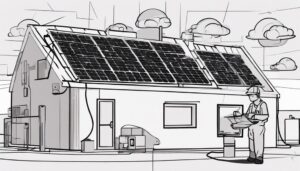Wondering if your solar panels are effectively harnessing the sun's energy to power your home? Understanding the signs of a well-functioning solar system is crucial for maximizing its benefits. From subtle indicators like the sound of the inverter to utilizing performance monitoring tools, there are various ways to ensure your panels are in top condition. But how can you be sure without professional help? Understanding these key points can provide you with the confidence needed to monitor your solar panel system efficiently and effectively.
Key Takeaways
- Monitor real-time data for energy production levels.
- Regularly inspect panels for damage or dirt accumulation.
- Check energy meter for high generation and low consumption.
- Utilize performance monitoring tools to optimize efficiency.
Understanding Solar Panel Functionality
To understand how solar panels function, you must grasp the principles of photovoltaic technology. Solar panels work by converting sunlight into electricity through the photovoltaic effect. This process involves the generation of electric current when sunlight strikes the semiconductor material within the solar panel. The energy production is dependent on the intensity of sunlight received. The generated electricity can be used to power homes, businesses, and even entire cities.
Output verification is crucial in ensuring that solar panels are functioning efficiently. It involves monitoring the energy production levels of the panels to confirm that they are meeting the expected output. This can be done through the use of monitoring systems that track the amount of electricity generated by the panels. By regularly verifying the output of your solar panels, you can ensure that they are operating at optimal levels and identify any potential issues that may arise.
Understanding the principles of energy production and output verification is essential for maximizing the efficiency and effectiveness of your solar panels. By monitoring these factors closely, you can ensure that your solar panel system is functioning properly and delivering the expected results.
Monitoring Power Generation Efficiency
Efficient monitoring of solar panel power generation is crucial for optimizing performance and ensuring maximum output efficiency. To track efficiency and conduct performance analysis effectively, consider the following:
- Real-Time Monitoring: Utilize monitoring systems that provide real-time data on your solar panel's energy production. This allows you to promptly address any issues that may arise, ensuring optimal efficiency at all times.
- Historical Data Comparison: Compare current energy production with historical data to identify trends and deviations. This analysis can help in predicting potential performance issues and taking proactive measures to maintain efficiency.
- Performance Alerts: Set up alerts within your monitoring system to notify you of any significant drops in energy production. Being promptly informed about such changes enables you to investigate and rectify the problem swiftly, minimizing energy loss.
Importance of Regular Inspection and Maintenance
Regular inspection and maintenance are essential for ensuring the optimal performance and longevity of your solar panel system. By following a structured maintenance schedule, you can address issues promptly and maximize the efficiency of your solar panels. Here are some key aspects to consider for maintaining your solar panel system:
| Aspect | Description | Frequency |
|---|---|---|
| Cleaning | Regularly clean the panels to remove dirt, dust, and debris that can impact sunlight absorption. | Every 1-3 months |
| Inspection | Inspect panels for any signs of damage, such as cracks or hotspots, that may affect performance. | Every 6 months |
| Weather Impact | Monitor the impact of weather conditions on your panels, such as snow accumulation or shading from nearby trees or buildings. | Seasonally |
| Connections Check | Ensure all electrical connections are secure and functioning correctly to prevent power loss or system failure. | Yearly |
Utilizing Performance Monitoring Tools
For optimal maintenance and performance of your solar panel system, consider implementing performance monitoring tools. These tools play a crucial role in ensuring your system operates at its best capacity. Here are three key benefits of utilizing performance monitoring tools:
- Real-Time Data Analysis: Performance monitoring tools provide real-time insights into the efficiency of your solar panels. By analyzing this data, you can identify any issues promptly and take corrective actions to maximize energy production.
- Performance Optimization: Through continuous monitoring, you can track the performance of your solar panels over time. This data allows you to fine-tune the system for optimal efficiency, ensuring you get the most out of your investment.
- Alert Notifications: Performance monitoring tools often come with alert features that notify you of any deviations from expected performance. This proactive approach enables you to address potential problems swiftly, minimizing downtime and maximizing energy generation.
Reading Your Energy Meter for Validation
To validate the performance of your solar panel system accurately, understanding how to read your energy meter is crucial. Your energy meter provides essential data on the electricity your solar panels generate and the energy your household consumes. By interpreting meter readings correctly, you can confirm if your solar panels are working efficiently.
Energy Meter Reading Guide:
| Meter Reading | Explanation | Interpretation | Action |
|---|---|---|---|
| High Generation | Solar panels active | System functioning | Monitor regularly |
| Low Consumption | Efficient energy use | Good practices | Continue behavior |
| Low Generation | Solar panels inactive | Issue with panels | Check connections |
| High Consumption | Energy demand exceeds | Adjust energy usage | Investigate usage |
Frequently Asked Questions
How Long Do Solar Panels Typically Last Before Needing to Be Replaced?
Solar panels typically last around 25-30 years before needing replacement. Factors affecting longevity include solar panel efficiency and maintenance. Regularly checking for debris, monitoring performance, and scheduling professional inspections can help prolong their lifespan.
Are There Any Government Incentives or Tax Credits Available for Installing Solar Panels?
When considering solar panel installation, you may benefit from government incentives and tax credits. These can significantly reduce costs and improve solar panel efficiency. Research available programs to maximize savings and make your investment more affordable.
Can Solar Panels Still Generate Electricity on Cloudy or Rainy Days?
On cloudy or rainy days, solar panel efficiency may decrease due to reduced sunlight. Weather impact is a key factor affecting electricity generation. Panels still generate power in these conditions, but at a lower rate.
What Is the Average Cost of Repairing or Replacing a Malfunctioning Solar Panel?
When dealing with malfunctioning solar panels, the cost estimation for repair or replacement can vary depending on the issue. To keep expenses in check, regular maintenance tips are crucial to prolong the lifespan of your panels.
How Do Extreme Weather Conditions, Such as Hail or Snow, Affect the Performance of Solar Panels?
During extreme weather, hail can damage solar panels, affecting their performance. Snow accumulation can reduce sunlight absorption, diminishing panel output. It's crucial to monitor and assess panels after such conditions to ensure optimal functionality.
Conclusion
In conclusion, ensuring the functionality of your solar panels is crucial for maximizing power generation efficiency. Regular inspection, maintenance, and monitoring are key steps in verifying that your system is working properly. Utilizing performance monitoring tools and reading your energy meter can provide valuable insights into the performance of your solar panels. By staying proactive and vigilant in monitoring your system, you can ensure that your investment in solar energy continues to benefit you in the long run.



